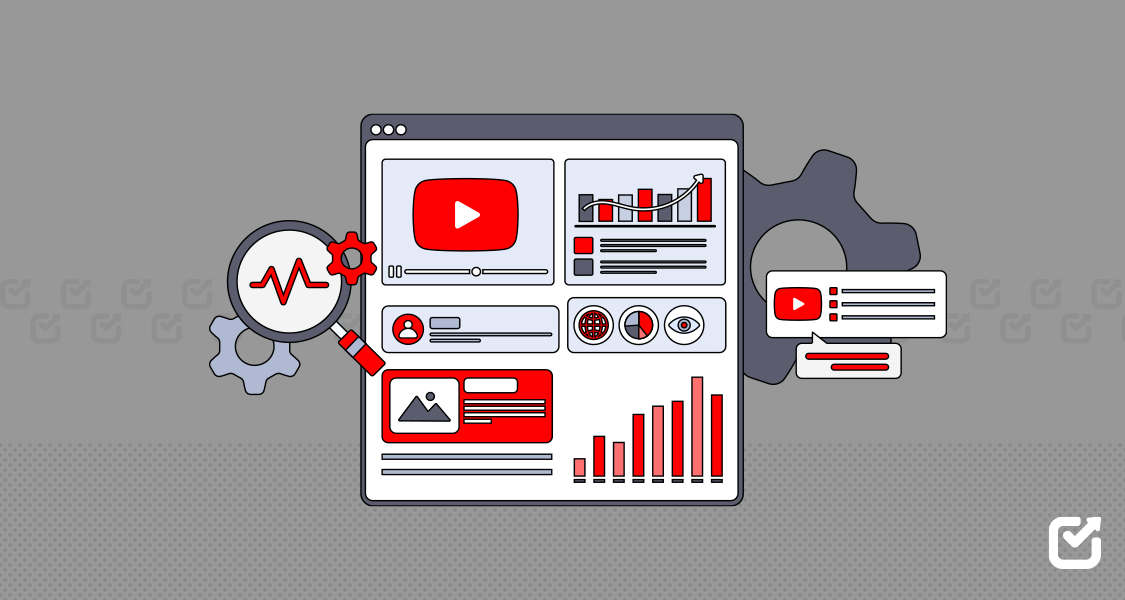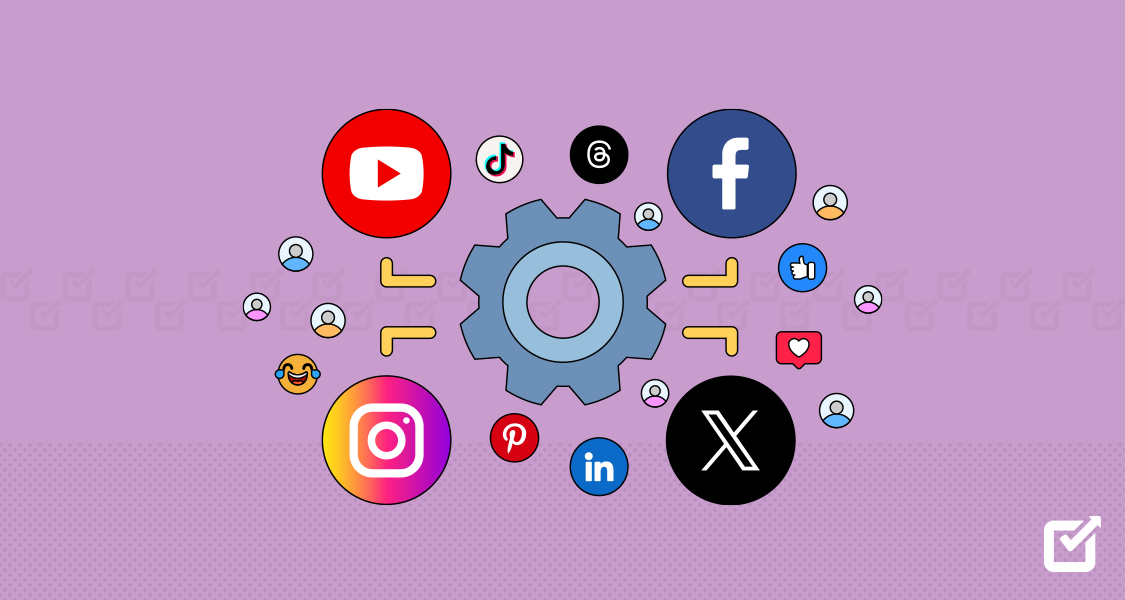AI in the ecommerce market is exploding, projected to reach a whopping $8.65 billion in 2025! It’s not just a trend; it’s a fundamental shift.
However, AI isn’t just about targeted ads.
AI can analyze mountains of data – way more than any human could – and use those insights to predict what your customers want before they even know it themselves.
This is where the power of AI Tools for ecommerce truly shines.
In this blog, we’ll dive into how AI is transforming the online shopping experience, showcase the best AI tools, and even give you a heads-up about future AI trends in e-commerce.
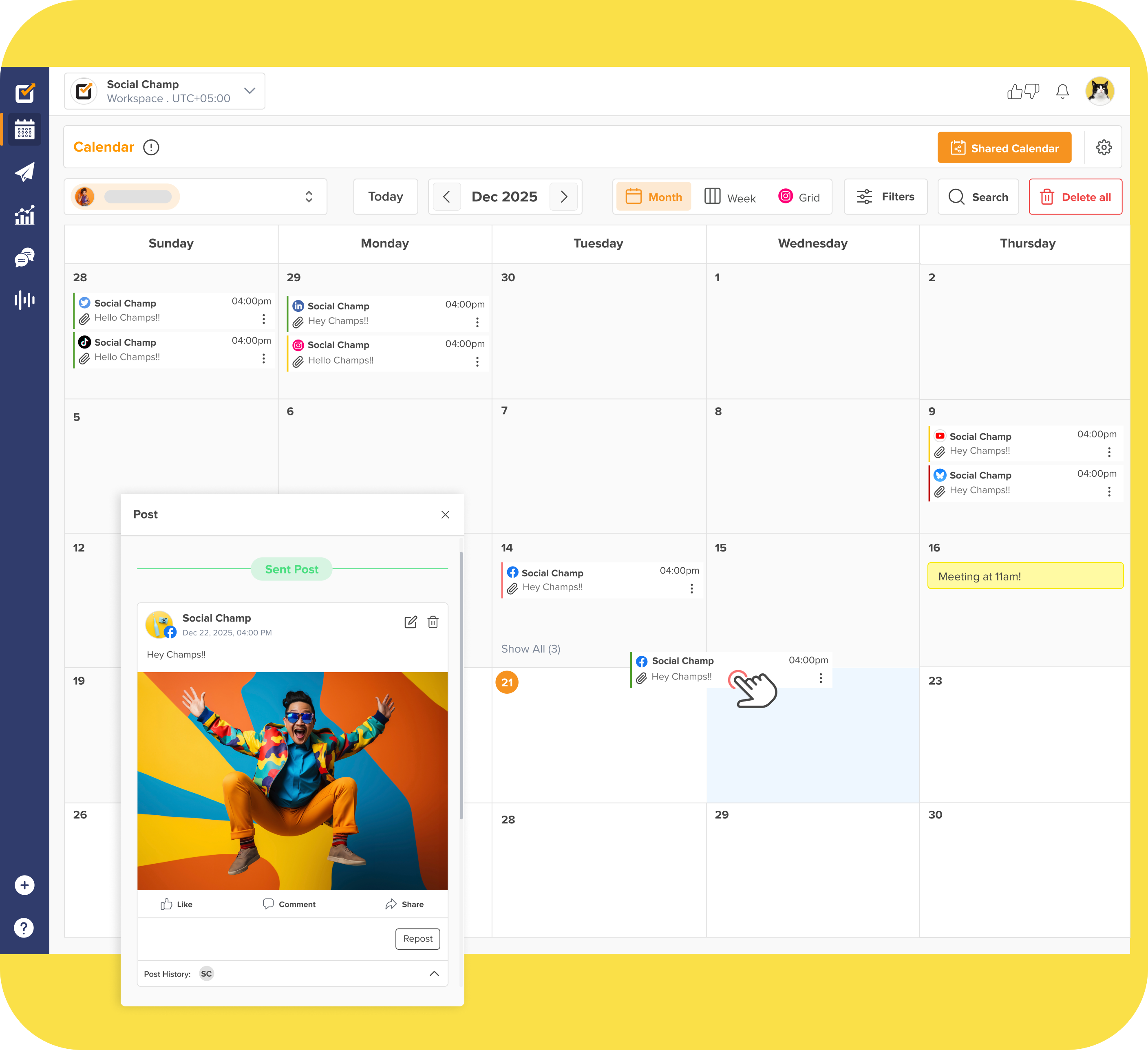
Your Competitors Are Selling More—Are You?
Social Champ helps eCommerce brands dominate social media with automated posting, AI-powered insights, and real-time engagement tracking.
Short Summary
- AI tools are essential for ecommerce businesses in 2025, offering benefits like automation, personalization, and enhanced customer experience.
- Key areas where AI is transforming e-commerce include marketing, customer service, analytics, and supply chain management.
- Popular AI tools for ecommerce include Social Champ, HubSpot, and AdRoll for marketing, Drift, Zendesk, and Tidio for Customer Service, Zapier, Make, and Omnisend for Automation, Google Analytics, DataRobot and Sisense for Analytics.
- AI helps businesses automate tasks, personalize customer experiences, and optimize performance, leading to increased sales.
- Key future trends in AI for ecommerce include hyper-personalization, voice commerce, predictive analytics, and AI-powered AR.
How AI is Transforming Ecommerce Growth in 2025?
The integration of AI into ecommerce is no longer just about improving operational efficiency; it is also about shaping the customer journey in a way that feels seamless and personalized.
AI is revolutionizing several aspects of ecommerce business operations, from customer service to marketing automation.
Let’s explore how AI is revolutionizing ecommerce growth in 2025:
- Automation: AI-driven tools can automate routine tasks such as order processing, inventory management, and customer inquiries. Automation frees up valuable time for ecommerce businesses to focus on strategic growth initiatives.
- Personalization: AI algorithms are capable of analyzing customer behavior and preferences to deliver personalized shopping experiences. From product recommendations to customized marketing campaigns, AI ensures that customers feel understood and valued, which increases the likelihood of conversions.
- Customer Experience: AI tools are enhancing the overall customer experience by providing quick responses to queries, offering tailored product suggestions, and even helping resolve issues in real-time. Chatbots, powered by AI, are being used more than ever to deliver customer service, improving customer satisfaction.
- Predictive Analytics: AI tools are equipped with predictive capabilities that allow ecommerce businesses to forecast trends, customer behavior, and product demand. With this foresight, businesses can make better decisions regarding inventory, promotions, and marketing efforts.
- Supply Chain Optimization: AI can streamline supply chain management by predicting demand, optimizing shipping routes, and forecasting inventory needs. This results in reduced costs, faster deliveries, and a smoother operation.
In short, AI is transforming the way businesses operate and interact with their customers.
By providing deeper insights and automating key processes, AI tools for ecommerce are helping businesses thrive in an increasingly competitive market.
Featured Article: Understanding Gen Z Consumer Behavior: Insights for 2025
15+ Best AI Tools for Ecommerce to Scale Your Business
With AI becoming an essential part of ecommerce operations, there is a wide range of AI tools that cater to different business needs.
Whether you’re looking to enhance marketing efforts, improve customer service, automate business operations, or analyze data, there’s an AI tool designed to help.
Below are the best AI tools categorized based on their use cases:
AI Tools for Marketing
-
Social Champ
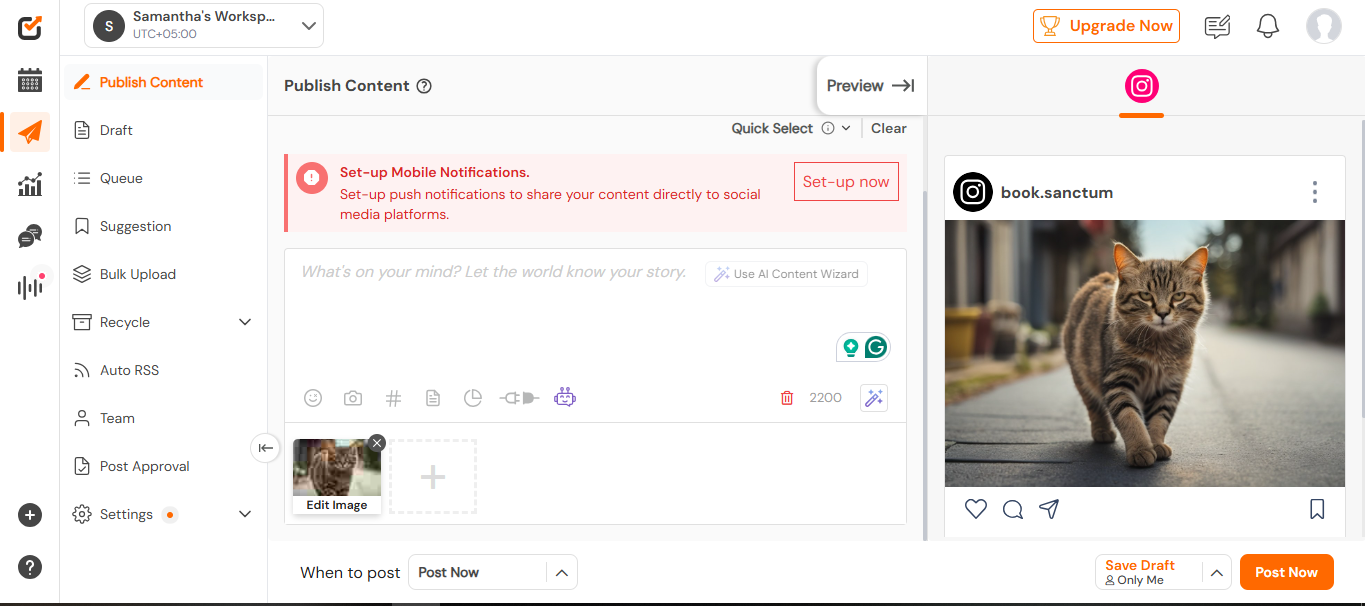
Social Champ’s Dashboard Social Champ is a game-changer for businesses looking to automate and streamline their social media marketing efforts.
This AI tool for ecommerce allows businesses to schedule and automate social media posts across multiple platforms, such as Facebook, Instagram, Twitter (X), and LinkedIn.
Social Champ uses machine learning algorithms to analyze audience engagement, helping businesses determine the best times to post and which content resonates the most with their followers.
Key Features
- Automate and schedule posts across various platforms.
- Analyze audience engagement to optimize posting times.
- Increase brand visibility through consistent social media presence.
- Efficiently manage marketing efforts, freeing up time for other tasks.
Social Champ AI Suite
Another cool feature offered by Social Champ is Champ’s AI Suite.
This amazing tool allows you to create original captions with AI Content Wizard, generate eye-catching images with AI Imaginator tool, conduct sentiment analysis, and even suggest the best time to post according to your audience demographic and industry.
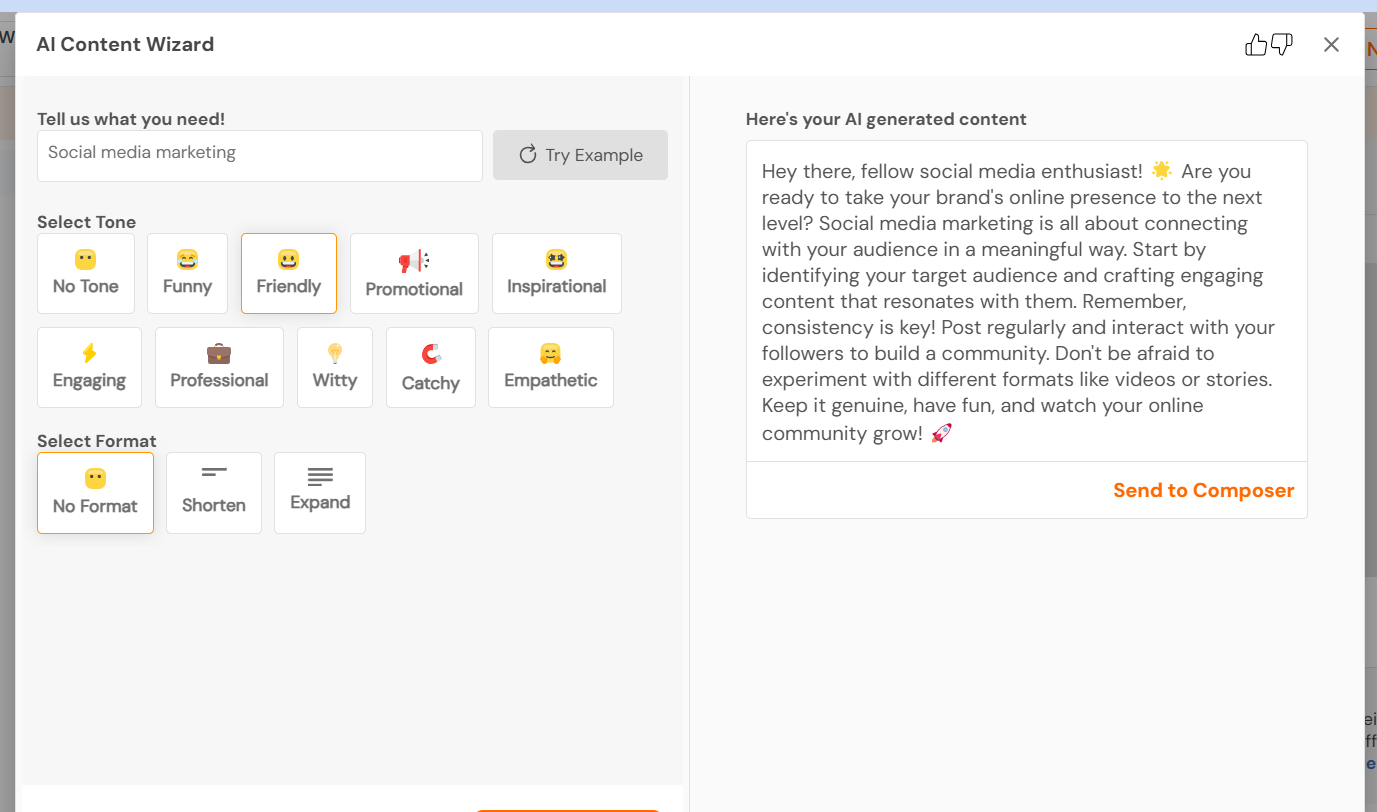
AI-Generated Caption With the Help of Social Champ’s AI 
Boost Your Brand’s Reach With Social Champ!
Social Champ automates your eCommerce social media, schedules high-converting posts, and tracks real-time performance—so you sell more while doing less.
-
HubSpot
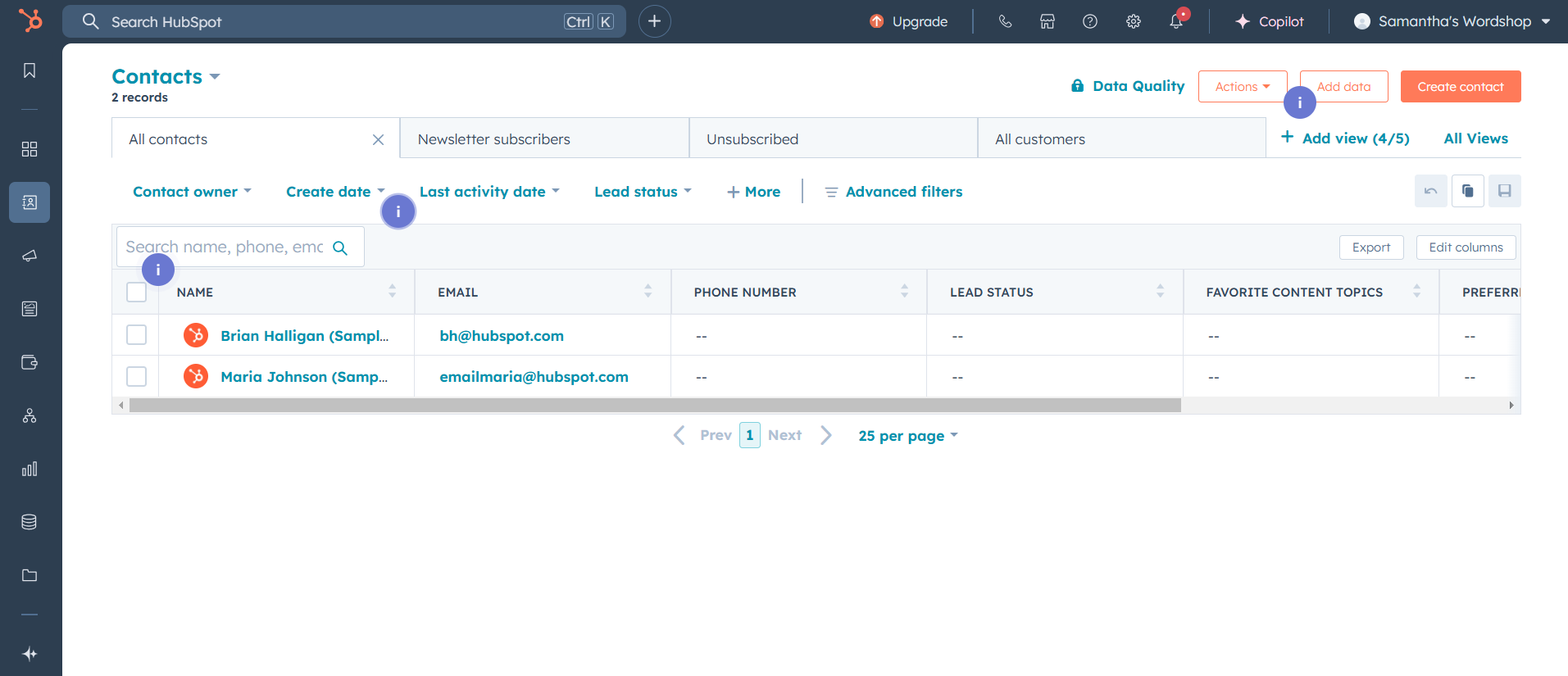
Hubspot’s Dashboard HubSpot is a powerful AI tool for ecommerce marketing, offering a range of automation tools that can enhance lead generation, email marketing, and content marketing strategies.
This platform helps ecommerce businesses track leads, segment their audience, and nurture relationships, all powered by AI.
By automating repetitive tasks, HubSpot frees up time for marketers to focus on high-level strategies that drive results.
Key Features
- AI-driven lead generation and lead nurturing.
- Personalization of emails and marketing campaigns.
- CRM tools to track customer interactions and optimize sales funnels.
- Content marketing tools that enhance blog posts and social media content.
-
AdRoll
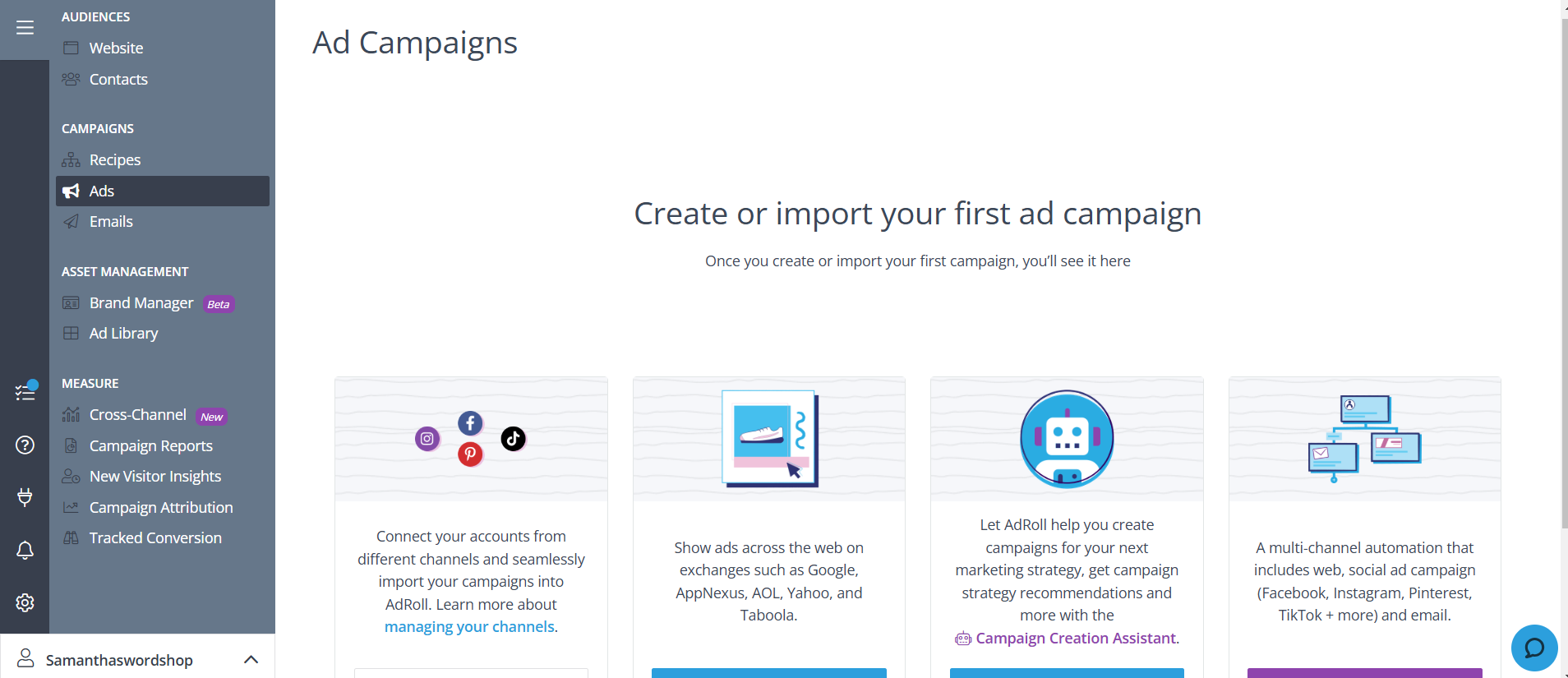
AdRoll’s Dashboard AdRoll focuses on optimizing ad campaigns for ecommerce businesses, using AI to retarget customers and drive higher engagement through display and social media ads.
By analyzing customer data and behavior, AdRoll’s machine learning algorithms determine the best ads to show to each user, ensuring that businesses reach the right audience at the right time.
Key Features
- Retargeting capabilities to bring customers back to your site.
- AI algorithms to optimize ad campaigns and improve ad performance.
- Multi-channel ad campaign management (social media, display ads, and more).
- Insights into customer behavior to refine ad strategies.
-
Klaviyo
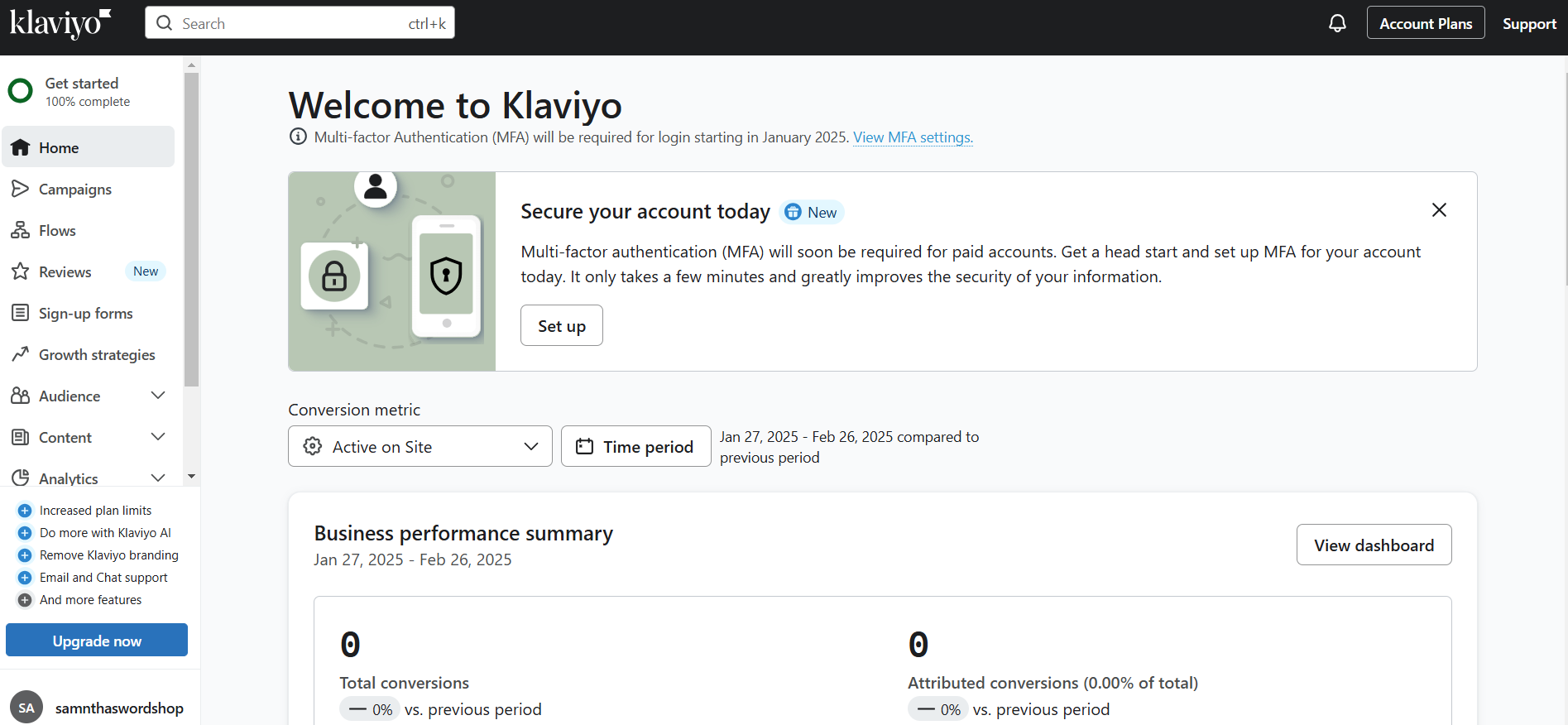
Klaviyo’s Dashboard Klaviyo is an AI-powered email marketing platform that helps ecommerce businesses deliver personalized and relevant messages to their customers.
By analyzing customer behavior, purchase history, and other data points, Klaviyo helps businesses create targeted campaigns that drive higher open rates, click-through rates, and conversions.
Key Features
- Advanced segmentation for personalized email campaigns.
- AI-driven automation for abandoned cart recovery, welcome series, and post-purchase emails.
- Data-driven insights to optimize email content and timing.
- Integration with ecommerce platforms like Shopify, Magento, and BigCommerce.
-
Phrasee
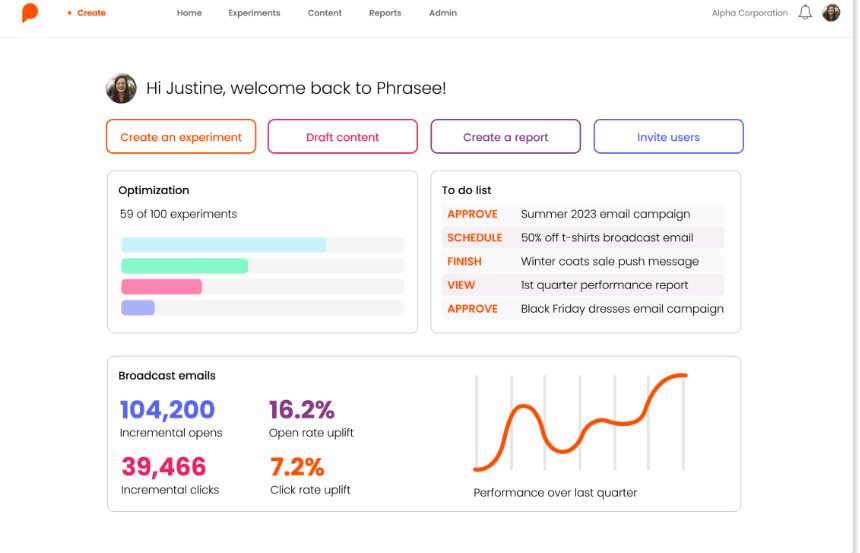
Phrasee’s Dashboard Phrasee uses AI to optimize marketing copy across email campaigns, social media ads, and website content.
Through analyzing customer preferences and behavior, Phrasee generates persuasive copy that is tailored to the audience, helping businesses create high-performing content that resonates with their target market.
Key Features
- AI-driven copywriting for emails, ads, and web content.
- A/B testing to identify the most effective messaging.
- Optimizes language to improve open rates and conversions.
- Creates compelling headlines and subject lines for emails.
AI Tools for Customer Service
With AI-driven tools, businesses can automate routine support tasks, personalize customer interactions, and resolve issues faster.
Here are some of the best AI tools for ecommerce businesses when it comes to customer service:
-
Salesloft’s Drift AI
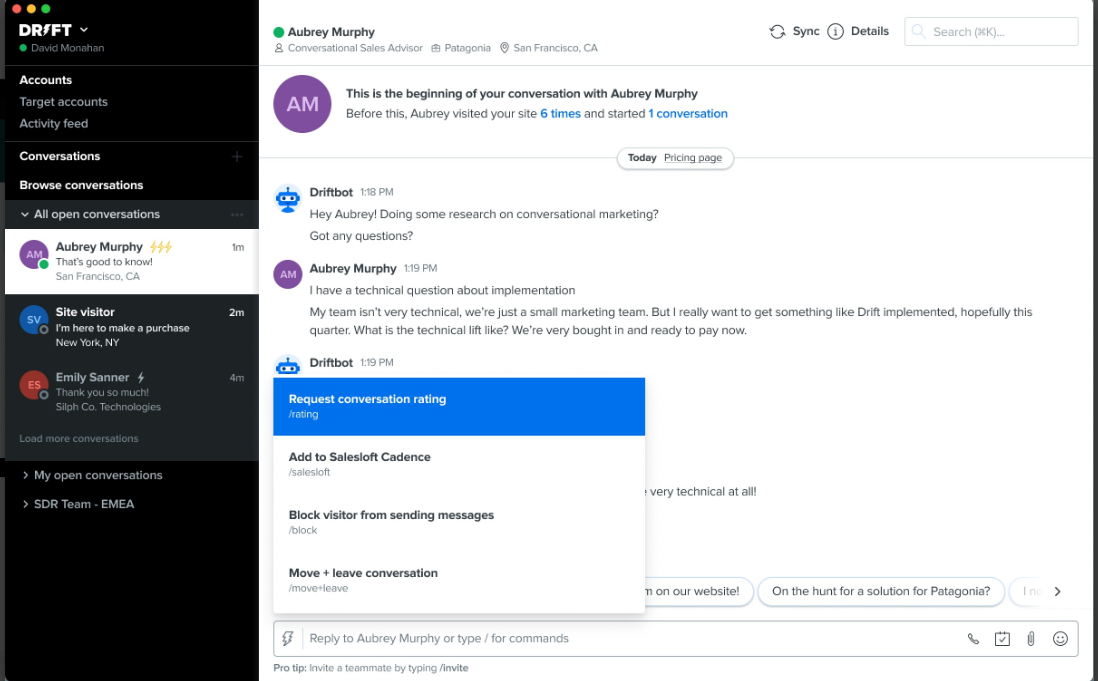
Drift’s Dashboard Drift is an AI-powered chatbot that helps ecommerce businesses automate customer service conversations on their website.
This AI tool can handle a wide range of tasks, including answering customer inquiries, qualifying leads, and offering personalized responses.
By using Drift, businesses can improve customer satisfaction while freeing up valuable time for customer service teams to focus on more complex tasks.
Key Features
- Automates customer service conversations in real time.
- Qualifies leads and helps push them further down the sales funnel.
- Provides personalized responses to customer inquiries, improving engagement.
- Reduces the workload on customer support teams, allowing them to focus on more complex issues.
Drift’s AI capabilities make it a must-have tool for ecommerce businesses that want to enhance the customer service experience while reducing response times and increasing efficiency.
-
Zendesk
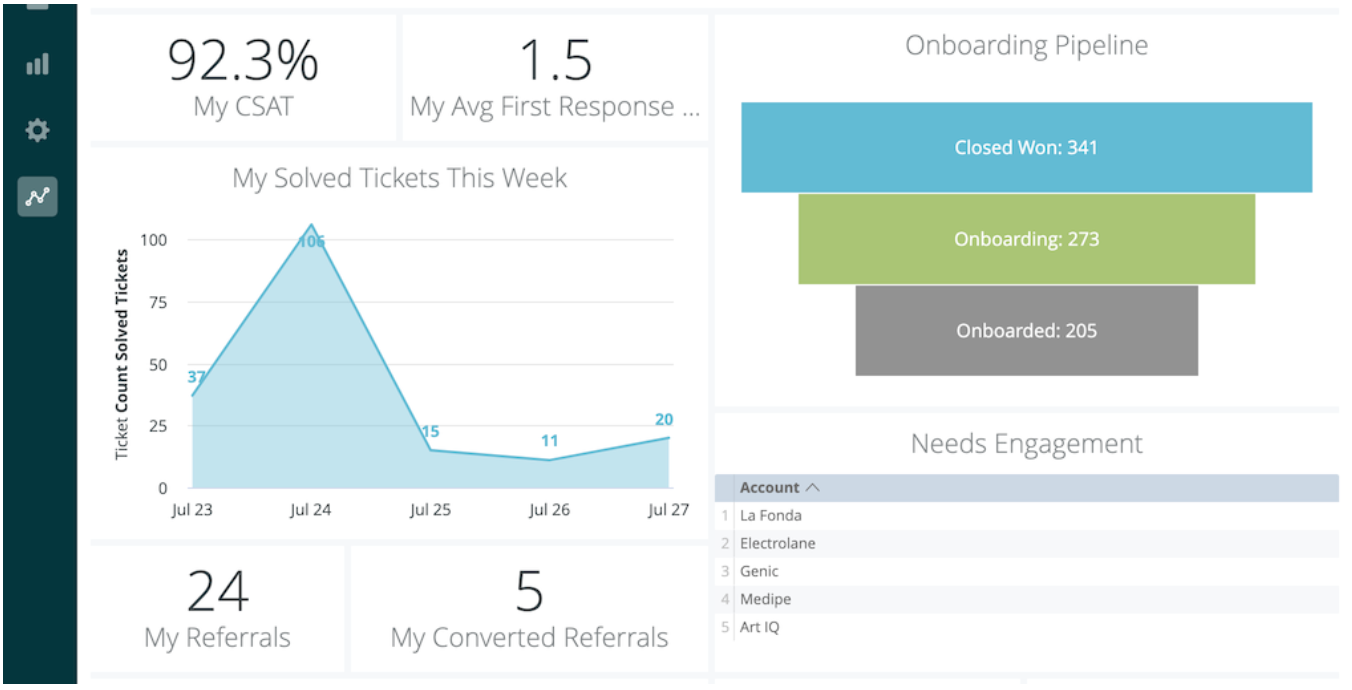
Zendesk’s Dashboard Zendesk is a leading AI tool for ecommerce business that simplifies customer support through an AI-driven platform.
It offers tools to manage support tickets, automate responses, and provide smarter solutions for better customer service.
Zendesk’s AI system categorizes, prioritizes, and routes customer tickets, ensuring that businesses can handle inquiries more effectively and efficiently.
Key Features
- AI-powered ticket categorization and prioritization to streamline customer support.
- Automates responses to common customer inquiries, improving response times.
- Provides AI-based solutions for handling support requests, reducing manual intervention.
- Real-time analytics to monitor and optimize customer support performance.
Zendesk’s AI-driven platform makes it easier for ecommerce businesses to manage customer service efficiently, improving overall customer experience and reducing operational costs.
-
Tidio
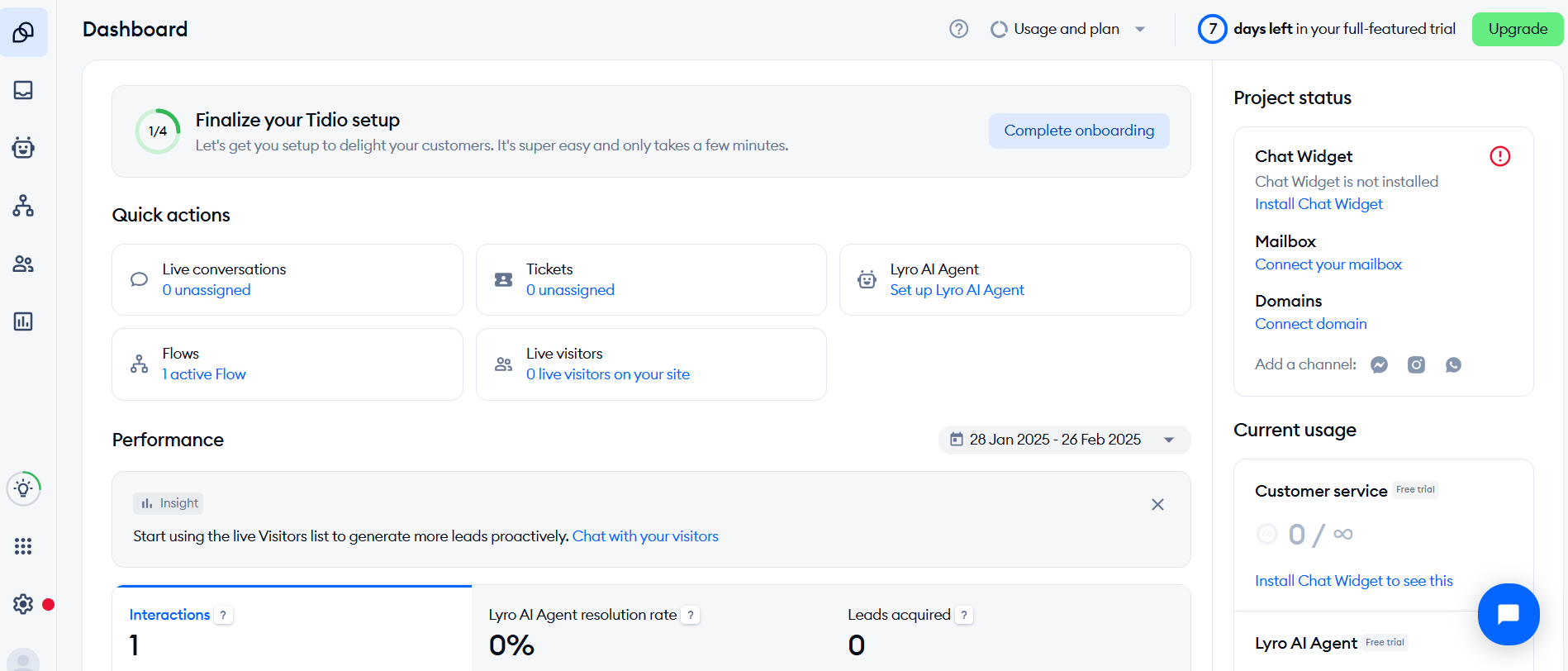
Tidio’s Dashboard Tidio offers AI-powered live chat and chatbot tools designed to enhance customer service for ecommerce businesses.
This platform is an excellent way to engage customers by providing instant responses to inquiries, offering product recommendations, and delivering support.
With Tidio, businesses can provide a more personalized experience, improve engagement, and reduce the workload on customer service teams.
Key Features
- AI-powered live chat with Lyro AI Agent chatbots that deliver instant responses to customer inquiries.
- Helps customers with product recommendations and troubleshooting.
- Provides support 24/7, ensuring customers get answers whenever they need them.
- Reduces customer service team workload, allowing them to focus on more complex issues.
Tidio is a great AI tool for ecommerce businesses that improve customer engagement and satisfaction, all while ensuring faster response times and reducing operational stress on your team.
-
Freshdesk
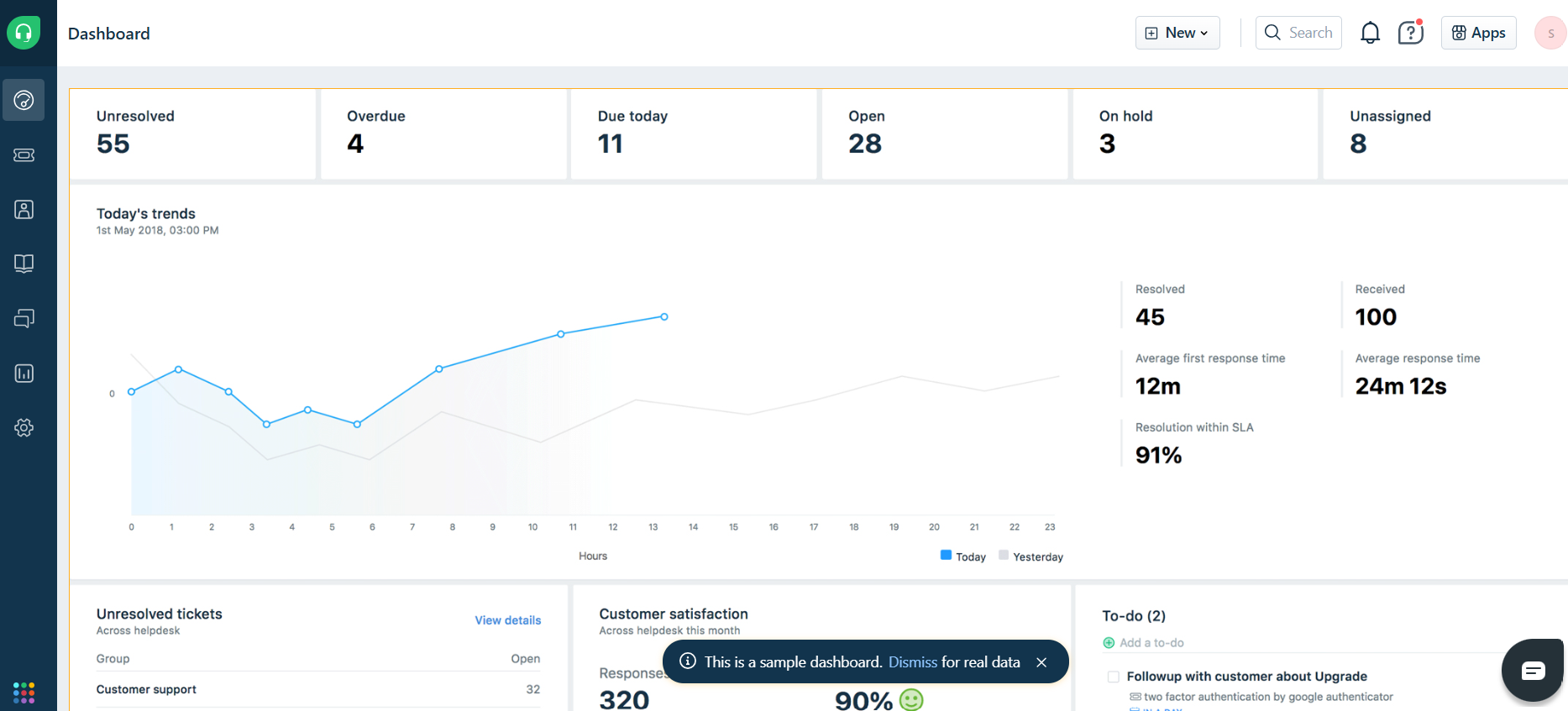
Freshdesk’s Dashboard Freshdesk is another AI tool for ecommerce that combines AI and human support to offer superior customer service.
The platform uses chatbots to answer frequently asked questions, automatically routes tickets, and offers AI-based solutions to speed up response times.
Freshdesk ensures that customer inquiries are handled promptly, with minimal human intervention, while still maintaining the human touch when needed.
Key Features
- AI-powered chatbots to handle customer inquiries and provide instant support.
- Automatic ticket routing to the appropriate team member for faster resolution.
- AI solutions to speed up response times and reduce customer wait times.
- Integrates with existing support channels, such as email, phone, and social media.
Freshdesk’s combination of AI and human support provides an ideal solution for ecommerce businesses that want to enhance their customer service without compromising on quality.
AI Tools for Automation
AI-powered automation tools can handle repetitive tasks, freeing up time for business owners and employees to focus on higher-value activities.
Here are some of the best AI tools for ecommerce that are perfect for automating key processes:
-
Zapier
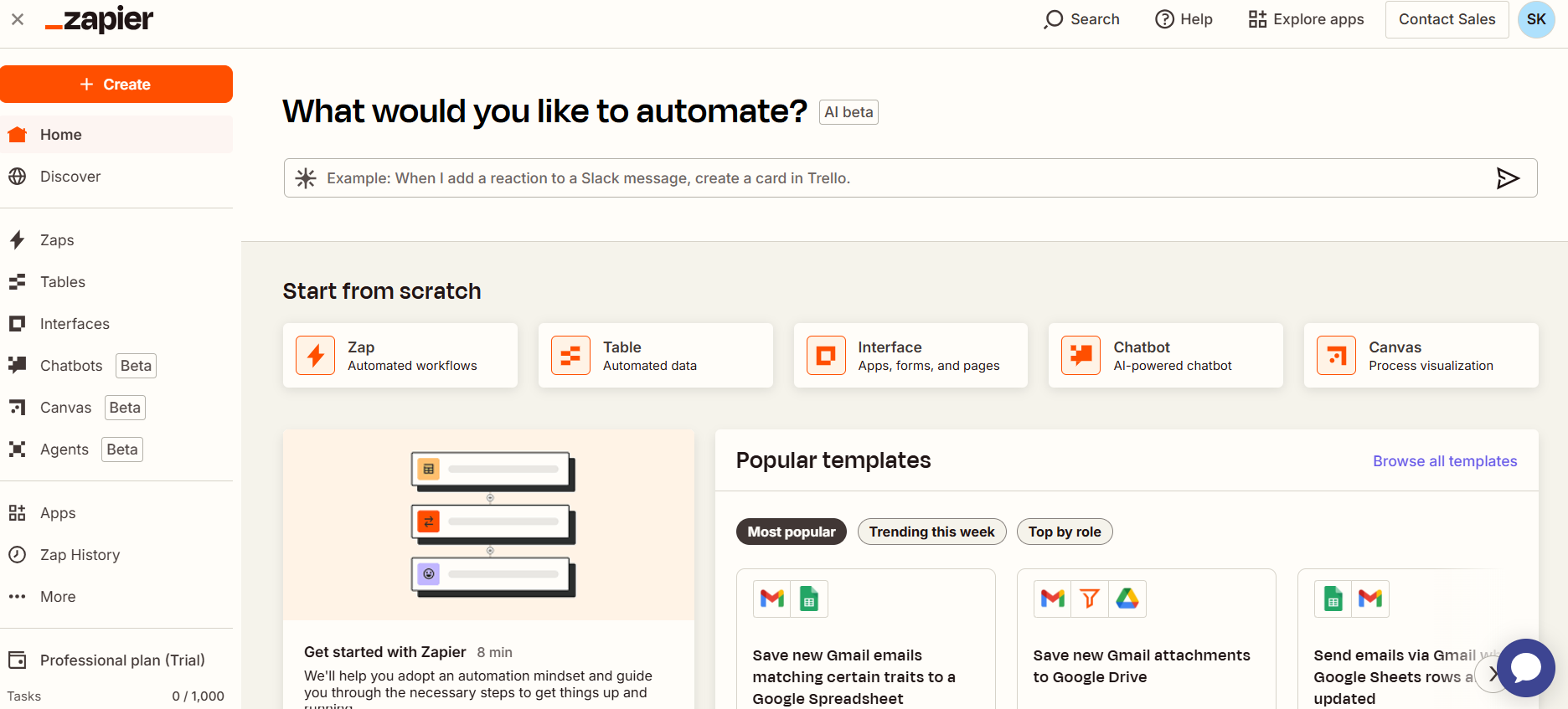
Zapier’s Dashboard Zapier is one of the leading AI tools for ecommerce business when it comes to automating workflows and connecting multiple apps.
This tool allows businesses to create automated “Zaps” that integrate various software platforms, making it easier to sync data and automate tasks.
Whether you need to automate marketing campaigns, customer service tasks, or inventory management, Zapier can handle it all.
Key Features
- Connects multiple apps and platforms to automate workflows.
- Automates tasks such as email marketing, order management, and inventory updates.
- Customizable automation rules to suit your business needs.
- Streamlines data transfer between apps, reducing manual entry.
With Zapier, ecommerce businesses can automate routine tasks across their systems, saving time and improving accuracy.
-
Make
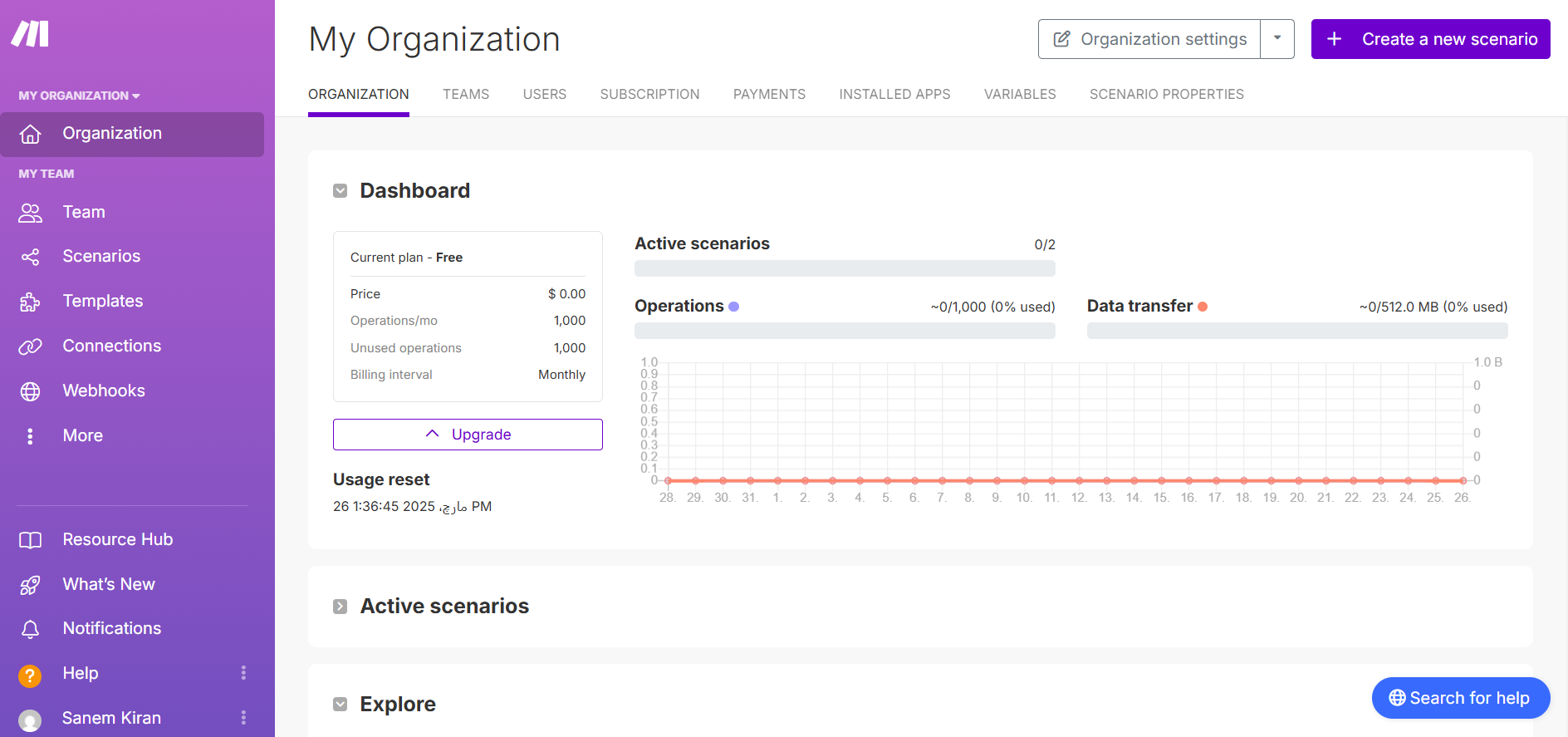
Make’s Dashboard Make is another powerful AI tool for ecommerce automation.
This platform integrates AI-driven automation into your business processes, allowing you to optimize tasks like order fulfillment, customer feedback collection, and inventory management.
Integromat’s visual interface makes it easy to create complex workflows without needing advanced technical skills.
Key Features
- AI-driven automation for processes like order fulfillment, inventory management, and customer feedback.
- Connects with hundreds of apps to streamline business operations.
- Visual interface to build complex workflows with ease.
- Automates data synchronization across multiple platforms, improving efficiency.
Make’s automation capabilities make it an excellent choice for ecommerce businesses looking to optimize operations and reduce manual work.
-
Omnisend
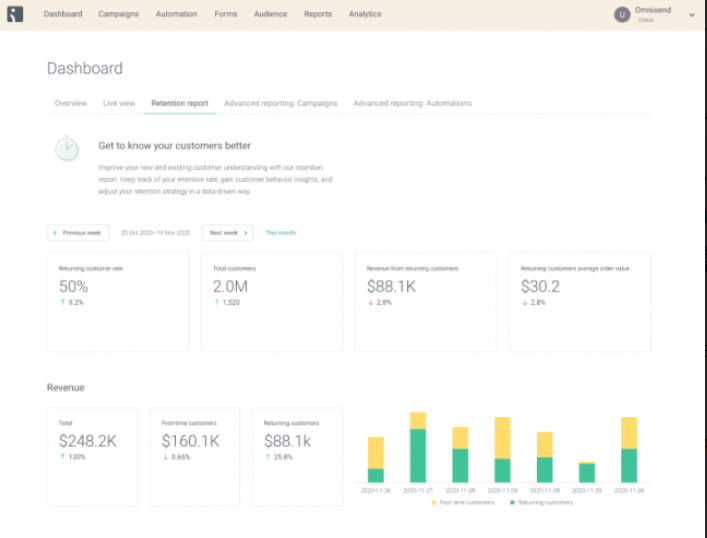
Omnisend’s Dashboard Omnisend is a marketing automation platform that leverages AI to help ecommerce businesses automate their email and SMS campaigns.
By personalizing communications based on customer behavior and preferences, Omnisend boosts customer engagement and drives higher sales.
Whether you’re sending welcome emails, abandoned cart reminders, or promotional offers, Omnisend ensures that each message is tailored to the recipient.
Key Features
- AI-driven email and SMS campaign automation.
- Personalized communications based on customer behavior and preferences.
- Automated segmentation to deliver relevant messages to different customer groups.
- Real-time analytics to track campaign performance and optimize results.
AI Tools for Analytics
These AI tools for ecommerce businesses enable companies to make data-driven decisions that foster growth and improve performance.
Let’s dive into the best AI tools for ecommerce analytics:
-
Google Analytics
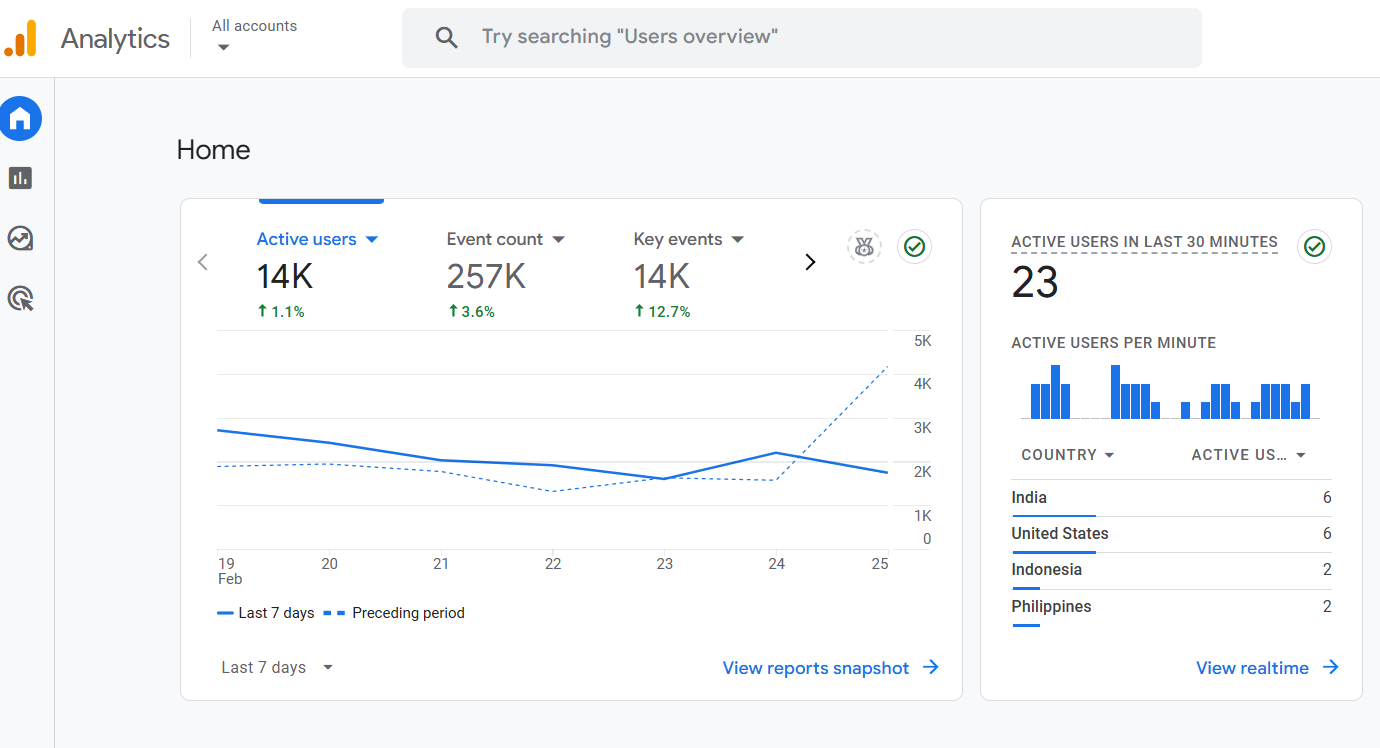
Google Analytics Dashboard Google Analytics is one of the most widely used AI tools for ecommerce, and now, it’s even more powerful with AI-enhanced features.
Google Analytics helps businesses analyze customer behavior and identify key trends that inform marketing strategies, product offerings, and sales tactics.
With its predictive insights, ecommerce businesses can forecast important metrics like sales, conversions, and customer behavior trends, helping them make smarter, data-driven decisions.
Key Features
- AI-powered insights for forecasting sales and conversions.
- Tracks user behavior across websites, apps, and other digital touchpoints.
- Provides predictive analytics to identify future trends and opportunities.
- Real-time reporting on key performance metrics (KPIs), allows businesses to act quickly.
By using Google Analytics, ecommerce businesses can dive deep into their data to understand customer preferences and behavior.
-
DataRobot
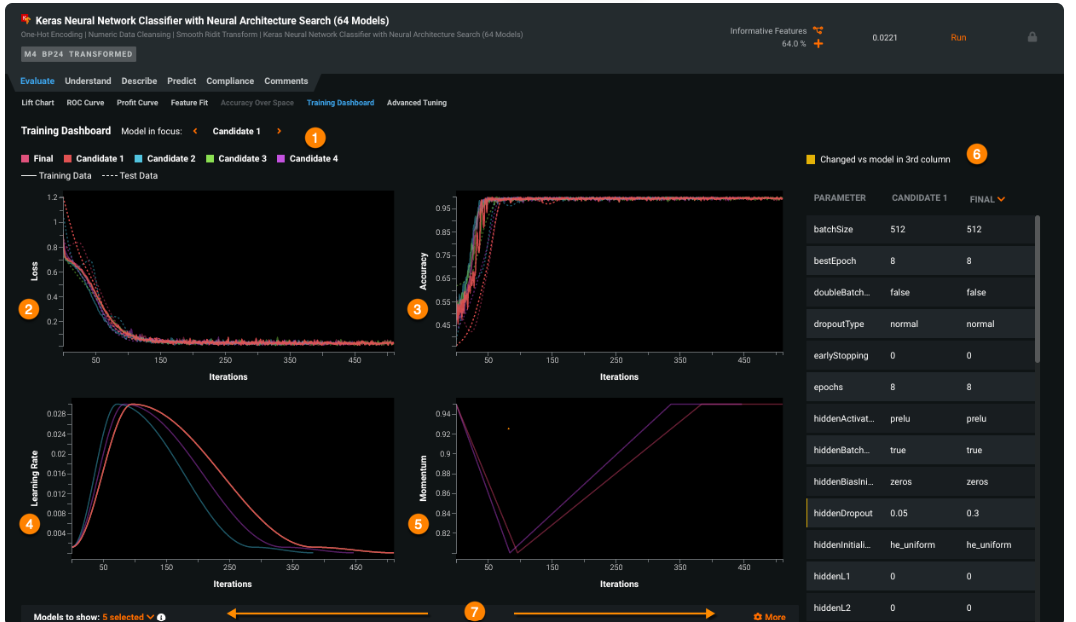
DataRobot’s Dashboard DataRobot is an advanced machine learning platform that allows ecommerce businesses to automate their data analysis processes.
The AI tool generates predictive models and identifies patterns in data, enabling businesses to make data-driven decisions that enhance performance.
DataRobot’s automation features help businesses streamline their analytics workflow, enabling them to optimize marketing, sales, and inventory strategies based on accurate, data-backed predictions.
Key Features
- Automates data analysis and generates predictive models.
- Helps ecommerce businesses identify trends and patterns to optimize performance.
- Provides recommendations on how to improve operations based on data insights.
- Integrates with existing data sources for seamless analysis and reporting.
With DataRobot, ecommerce businesses can quickly analyze large datasets, uncover hidden trends, and take proactive steps to improve overall performance.
-
Sisense
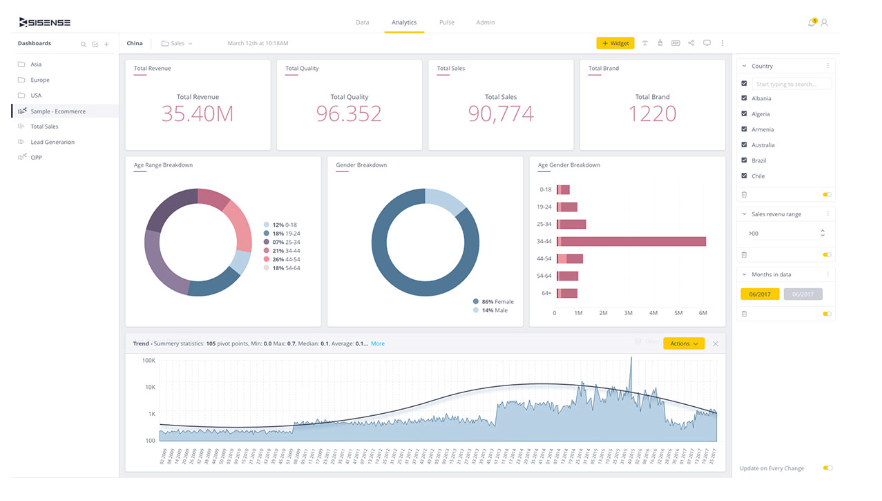
Sisense’s Dashboard Sisense combines AI and analytics to provide deep, actionable insights into ecommerce business data.
By integrating AI-powered analytics with its powerful data visualization tools, Sisense helps businesses track key performance metrics (KPIs), monitor trends, and make informed decisions based on real-time data.
With its easy-to-use interface and advanced AI features, Sisense enables businesses to visualize their data in meaningful ways, helping them optimize product offerings, marketing campaigns, and overall performance.
Key Features
- Combines AI and analytics for comprehensive data insights.
- Visualizes KPIs and trends through easy-to-read dashboards.
- Provides deep insights into business data to drive smarter decisions.
- Tracks customer behavior, sales performance, and other critical metrics.
Sisense’s AI-powered analytics tools help ecommerce businesses make data-driven decisions by visualizing trends and performance metrics.
-
Pendo

Pendo’s Dashboard Pendo is a product analytics platform that uses AI to track user behavior and collect feedback.
It delivers actionable insights that help ecommerce businesses optimize their product offerings and improve the customer journey.
Pendo’s AI-powered analytics tools provide detailed data on how users interact with products, which features they use the most, and where they encounter friction in their experience.
This data helps businesses make improvements that enhance user satisfaction and increase conversions.
Key Features
- AI-powered tracking of user behavior across ecommerce platforms.
- Collects user feedback to improve product features and user experience.
- Provides actionable insights that help businesses optimize the customer journey.
- Tracks product usage and identifies pain points in the user experience.
Featured Article: Instagram Reels Trends: What’s Hot in 2025
The Future of AI in Ecommerce: Trends You Can’t Ignore
As AI continues to evolve, it’s important to stay ahead of emerging trends that will shape the future of ecommerce.
In 2025, several key trends are expected to dominate the ecommerce landscape:
-
-
- AI-Driven Hyper-Personalization: AI will enable even more personalized experiences, such as offering tailored promotions and product recommendations in real-time based on a customer’s shopping history, browsing behavior, and preferences.
- Voice Commerce: With the rise of voice-activated devices like smart speakers, ecommerce businesses will integrate AI-driven voice assistants to facilitate shopping experiences. Voice search and voice-based purchasing will become increasingly important.
- AI-Powered Visual Search: Visual search allows customers to upload images and find similar products instantly. AI is revolutionizing visual search by making it more accurate and effective, improving the shopping experience.
- Predictive Analytics for Inventory Management: Predictive analytics will help ecommerce businesses forecast product demand, optimize inventory levels, and reduce stockouts. AI will play a central role in ensuring that businesses meet customer demand efficiently.
- AI in Augmented Reality (AR): The use of AR and AI in ecommerce is expected to grow, with virtual try-on tools and interactive experiences becoming more prevalent. AI will enhance AR capabilities by personalizing virtual experiences for each customer.
-
Conclusion
As we approach 2025, AI is transforming ecommerce in remarkable ways.
From automating marketing and customer service to offering hyper-personalized shopping experiences, AI tools are helping businesses scale and achieve significant growth.
Embracing these tools can not only streamline operations but also provide a competitive advantage in a rapidly evolving ecommerce landscape.
The best AI tools for ecommerce in 2025 will help businesses improve efficiency, increase sales, and enhance the overall customer experience.
By integrating AI-powered solutions, ecommerce companies will continue to adapt and thrive in an increasingly digital world.



